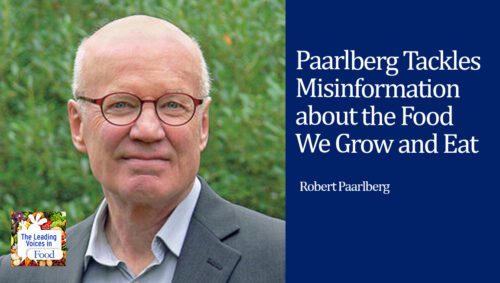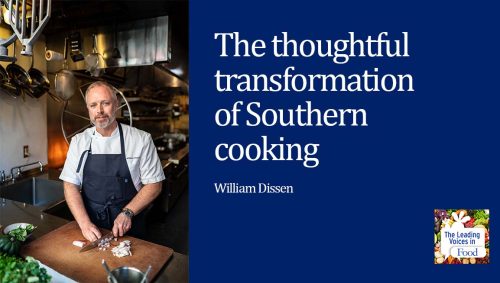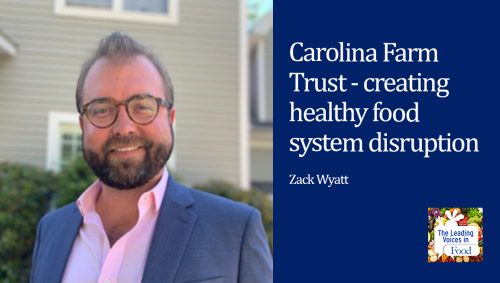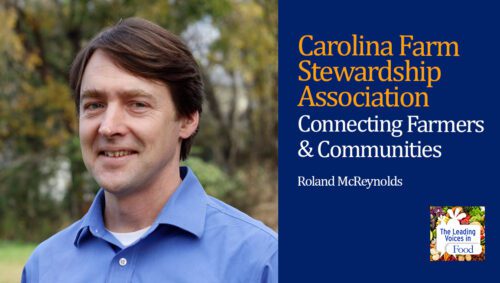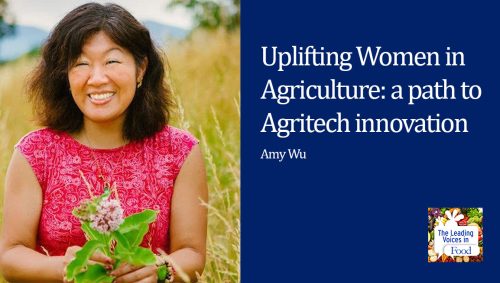The Leading Voices in Food
E70: Myths and Misperceptions about the Pork Industry
Have you ever wondered whether they are antibiotics or hormones in your grocery store pork chops? Or what swine farmers do with their pig waste? Or maybe you’re interested in buying locally grown foods, but you’re not sure what that really means when you’re in the grocery store. In this podcast, Marlowe Vaughn and Bob Ivey of Razorback farms in Goldsboro, North Carolina, tackle myths and misperceptions about the pork industry.
Subscribe: Apple Podcasts | TuneIN | YouTube Music | SoundCloud | PocketCasts | Radio Public
Tags: Agriculture & Tech | Antibiotic Resistance | North Carolina | Voice of Farming |

Marlowe Vaughn and Bob Ivey are the owners of Razorback farms in Goldsboro, North Carolina.
Interview Summary
Welcome to the Leading Voices in Food podcast, an educational series produced by the World Food Policy Center at Duke University. I’m Deborah Hill. You’re listening to a segment in our Voice of Farming series.
Have you ever wondered whether they are antibiotics or hormones in your grocery store pork chops? Or what swine farmers do with their pig waste? Or maybe you’re interested in buying locally grown foods, but you’re not sure what that really means when you’re in the grocery store. In this podcast, Marlowe Vaughn and Bob Ivey of Razorback farms in Goldsboro, North Carolina, tackle myths and misperceptions about the pork industry.
[Vaughn] Okay, so I’m a contract farmer, so that means that I grow pigs for another company. And I think people are under this misconception that I’m not a local farmer because I don’t sell to like the local meat market or the local farmer’s market, but I’m growing for the bigger picture. I’m growing for, you know, the majority of people in this country where, you know, the pork that you might go buy at your local Food Lion is my pork. You know, I take such pride in that, knowing that I’m getting this healthy, nutritious pork to these local, you know, these local Food Lions or, or these local grocery stores at a really good price.I think it’s important for the consumer to understand that I am your local farmer. Like I’m shopping just at the same grocery store you’re shopping at. I’m going to the, my kids are going to the same school your kids are going to. And taking that stigma away of, you know, I might be producing a larger volume, but it’s also going to your Wal-Mart or your Food Lion, or your, you know, these places where the majority of people, especially in this area, can afford to shop.
We have 10 houses here and each barn holds 720 hogs. So that’s the size of my farm. And I think, you know, people are under this misconception too, that just because I’m a larger farm that makes me a factory farm. For a farmer like me, especially getting in the business, that’s such a derogatory comment, because you know, we’re so much more than, than a factory that kind of makes it like, you know, we’re just pumping animals out every single day and if that’s what was going on, I think everybody would be a farmer. There’s so much more that goes into farming than, you know, than people understand. We’re providing food for the majority of the people in this country.
So I think that’s what needs to be understood about larger farms just because, you know, we operate just like any other business. My farm is a LLC. We’re not factories, we’re families. And 98% of the farmers in this country are families. So that’s one of the things as a millennial farmer, I’m hoping to kind of change people’s view on, on the size of the farm.
Yeah. And I think there’s so much that people just don’t understand. I mean I’ve got a huge presence on social media and just trying to tell, you know, my specific Ag story and everybody’s story is different. As a millennial farmer, and other farmers around this country that we kind of, you know, want to just tell our Ag story. Not only for ourselves but for the consumer. I mean we want the consumer to see transparency. I mean I think that’s what being a farmer’s all about.
[Ivey] One of the common missed perceptions is that that the integrator has them on antibiotics all the time. This integrator doesn’t use any sub therapeutic antibiotics at all. Nor does it use growth promoters. So typically there’s no medication given to the pigs except under the direction of a veterinarian and they get, take a sample. They can actually take and hang ropes in, in the barns, and the pigs, can chew on the ropes and now PCR technology they can, they can take those ropes back to the lab and in less than a day they can have a diagnosis of the different diseases that are going on so that they can tailor their treatment specifically for what’s happening on the farm.And that’s really cool. Something, I mean, just think about it. I mean you do that with your child when you take it to the doctor and you know, they do a test for like strep throat right there and all that. We have that same technology now available to our industry. So it really cuts down on the use of drugs and also how we use them. So it’s a really big story but no one really tells or discusses that, you know, they still think it’s done, you know, like it was 30 years ago and it’s totally different now.
[Vaughn] The veterinarians we work with are through the integrator that that they have. So we have very important relationships with them and we work with them daily. And to kind of touch on what Dad said, you know, I think people are under this misconception, not only that we’re overusing antibiotics, but also people don’t realize that there are no hormones in pork or poultry. I mean we can’t give our hogs any hormones because they don’t exist. And I think, you know, those are some of the big buzz word that people like to harp on and they don’t understand that you know the truth behind them. And there’s so many misconceptions out there about what’s going on these farms. And I think transparency is what the Ag industry is striving for.And we have been transparent but you know, farmers have been so busy farming for 30 years that we’re just now getting on to talking about subjects that Dad talked about, like the new technologies out there that have evolved over the past 30 years. So I think it’s really important for the average consumer to understand farmers are recyclers. So everything that we use on this farm is recycled and that includes our manure and our manure really is an asset to us. We use it to help fertilize our crops. We contract with another farmer that we work very closely with that does array cropping. He does corn, soybean and wheat rotation out here, so we worked side by side with him on how much manure to apply to those crops and when. Absolutely, we work with NC State soil and management teams to incorporate what kind of nitrogen we need on that crop at a specific time and a specific date.
We also take samples of the soil prior to applying our manure on those crops and then we actually take a sample afterwards and I carry them up to Raleigh where they kind of analyze it for us and make sure that we’re applying properly.
[Ivey] Every farm has got a, they call it a waste management plan, we call it a nutrient management plan, that’s developed by the state. What Marlowe is required to do, she’s required to go to school to learn how to manage the nutrients on our farm. Take a test that’s approved by the state. And then if you’re, you know, pumping manure on your crops, you have to take a sample of the soil. You have to know what crop is being grown, which means you know, how much nitrogen or phosphorous or fertilizer it needs. And you have to record your pumping events and all that in a book that’s accessible to, to the state. And your equipment, in this case it could be it’s a linear traveler, but it could, could be whatever manure application you use, it has to be calibrated so that you know that it’s putting out, you know, the correct amount of manure. Manure is fertilizer and you don’t want to waste your fertilizer because if you waste your fertilizer, you’re throwing money away. So there’s a lot of technology on, in really, you know, the yield of crops, how they change in fields, and putting the right amount of manure, you know, for that crop to get the best yield.So I mean farming has really changed. You have to be really tough and row crop farmers have to be really smart too. And fertilizer’s the big input cost so they want to, you know, manage and do that appropriately. So a lot goes on there.
Well, odor’s a big deal, you know. And again, we talked about earlier about how when we first built our farms, there were no homes around those farms. But now over time there’s been a lot of urbanization and people would build right up close to them. The reason being is that they really, you know, the odor’s, smells like a farm but it’s not really obnoxious. Some of the things that we talked about earlier about feed and how we manage feed and nitrogen and to get more efficient as far as our manure management, that also helps with the odor. If you’re not, you know, putting more nitrogen lagoons to break down and if you’re putting these enzymes, this phosphorus, those type things and with pelleted feed, you’ve got a pellet that produces less dust in the barns and dust is really an important vector for carrying odor, you know?
All those things really help control the odor, and a lot of farmers, you know, are I mean they’re not pumping every day. They, you know, they can, they need to pump when they can, but they also understand that, that if there’s, you know, they’re in a more sensitive area and they need to respect the weekends and those type things. If they can, they certainly will do that, because you know, they want to be a good neighbor.
[Vaughn] Just to kind of harp on what Dad said, we’re on 80 acres on this specific farm and I used a center pivot to apply my fertilizer. Just a lot of talk about how often we’re pumping. Last year I looked at my pumping records and I only pumped 19 days out of the year. So I think people are under this misconception too that, you know, on this farm everyday I’m just pumping manure and, and not managing odor properly. And I think that’s very important to me specifically as a millennial farmer too. I think that’s an important issue to be conscious of when I’m pumping, you know, and look out for my neighbors and have a really good relationship with my neighbors.Thank you for listening. If you would like to subscribe to the Leading Voices In Food podcast series, you can do so at Google Play, Stitcher, Radio Public or Apple podcasts, or by visiting our website at the Duke World Food Policy Center. This is Deborah Hill.





